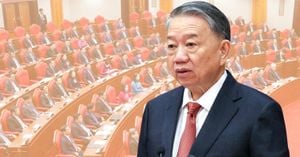The 2025 German Bundestag elections, held on February 23, 2025, marked a notable shift in the country’s political dynamics, with significant changes among party strengths and record voter turnout. Bastian Ernst of the Christian Democratic Union (CDU) emerged victorious with 27.3% of the first votes, followed closely by Hamza Atilgan of the Social Democratic Party (SPD) at 26.1% and Kay-Helge Kanstein from the Alternative for Germany (AfD) with 23.9%. This election highlighted the growing competition between traditional parties and rising forces like the AfD.
Historically, the SPD had dominated the region, but the election results showcased a startling turnaround. Just over three years ago, SPD candidate Susanne Mittag secured 39.4% of the votes during the previous election, leaving the CDU far behind at 24.2%. This time around, Ernst's campaign revitalized the party's standing, prompting local political analysts to declare the outcome as the district shifting from 'red' to 'black.'
At the same time, the voter participation surged to 77.7%, significantly up from 65.1% during the 2021 elections and 70.3% from 2017. This increase indicates the electorate's heightened interest and engagement with the political process, and many attributed this to the polarizing nature of the current political climate, particularly concerning immigration and socioeconomic issues.
Across various districts, the CDU led the charge; for example, Atilgan did manage to grasp the majority of the votes within his local district, where he garnered around 30% of the first ballots. Yet, the competition was intense, making every percentage point count as the results were tallied late at night.
International reactions to the election results varied significantly. Matteo Salvini, Italy's deputy prime minister, praised the outcome, claiming it as validation for the AfD's stance and calling for widespread changes across Europe. He stated, “Europe must be radically changed,” emphasizing the support for nationalist movements within Germany. Conversely, former U.S. President Donald Trump perceived the election's outcome as a substantial success for Germany, underscoring the global attention these results garnered.
Meanwhile, the AfD, which previously faced scrutiny and challenges authenticity as right-leaning populism gained traction, reported receiving 13.5% of the votes overall. Party leaders expressed optimism about entering negotiations for potential coalitions. Alice Weidel, the party's leader, explicitly stated, “We are open to coalition negotiations with the CDU,” hinting at political maneuvers as election fallout continues to shape discussions across party lines.
The logistics of the election process saw unexpected hurdles too—about half of the polling places ran short on ballots due to overwhelming turnout. Dr. Julia Figura, the district's election supervisor, remarked, “Although the organization team had anticipated strong participation, we had to replenish ballots at several locations.” This reflects not only the rushed preparations but also the unprecedented enthusiasm among constituents.
Overall, the results of the 2025 Bundestag elections signal transformative potential within the German political framework, showcasing shifts between long-standing party affiliations and presenting new challenges as the nation heads toward coalition talks. With parties such as the CDU regaining footing and the AfD solidifying its place, it is clear voters are seeking alternatives amid Germany’s changing socio-political narrative.



